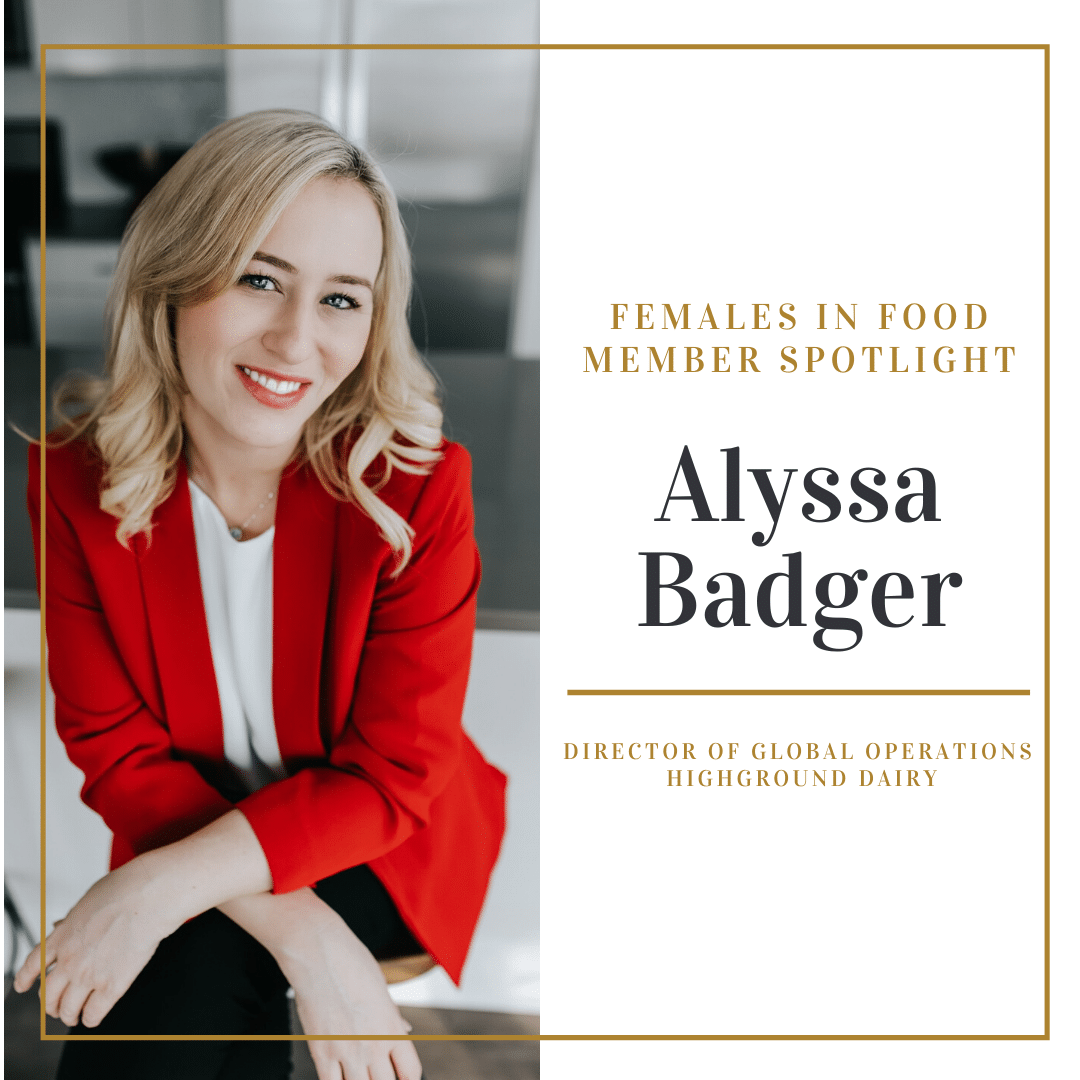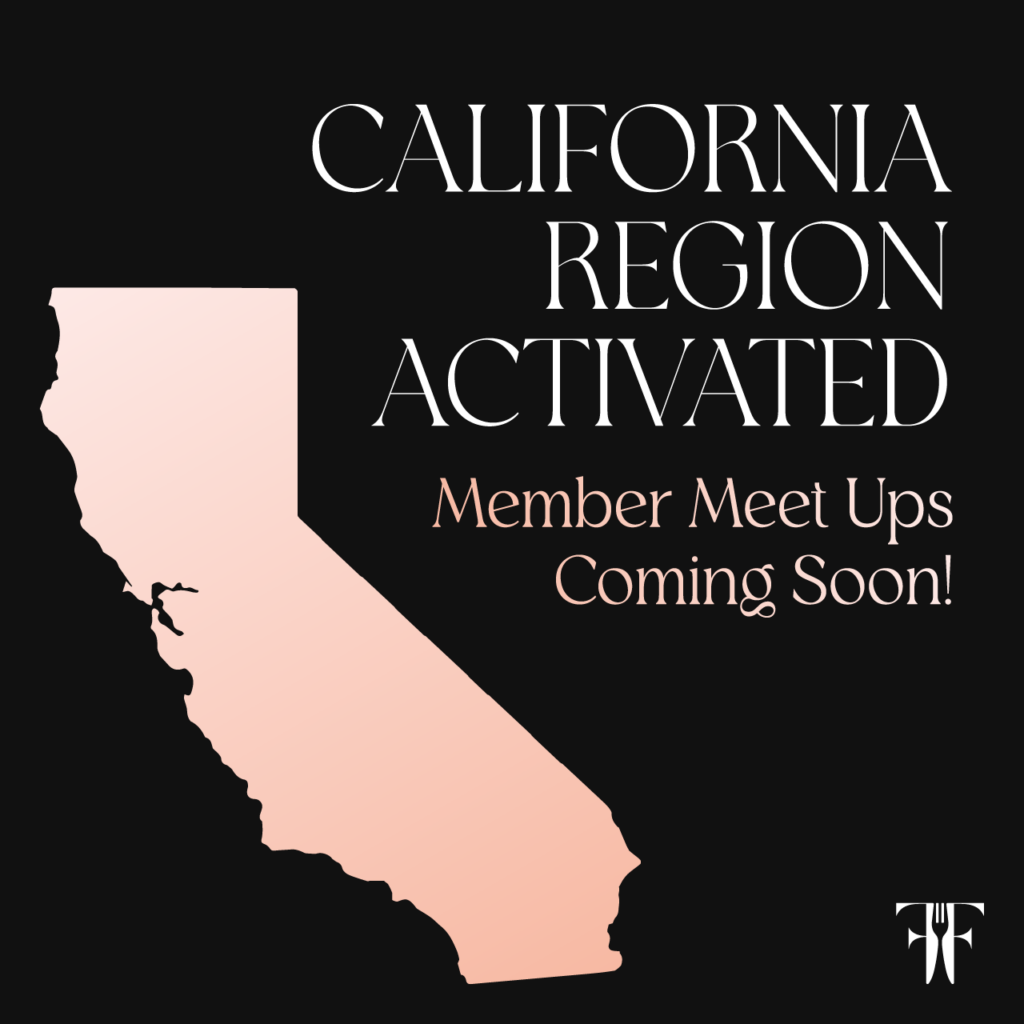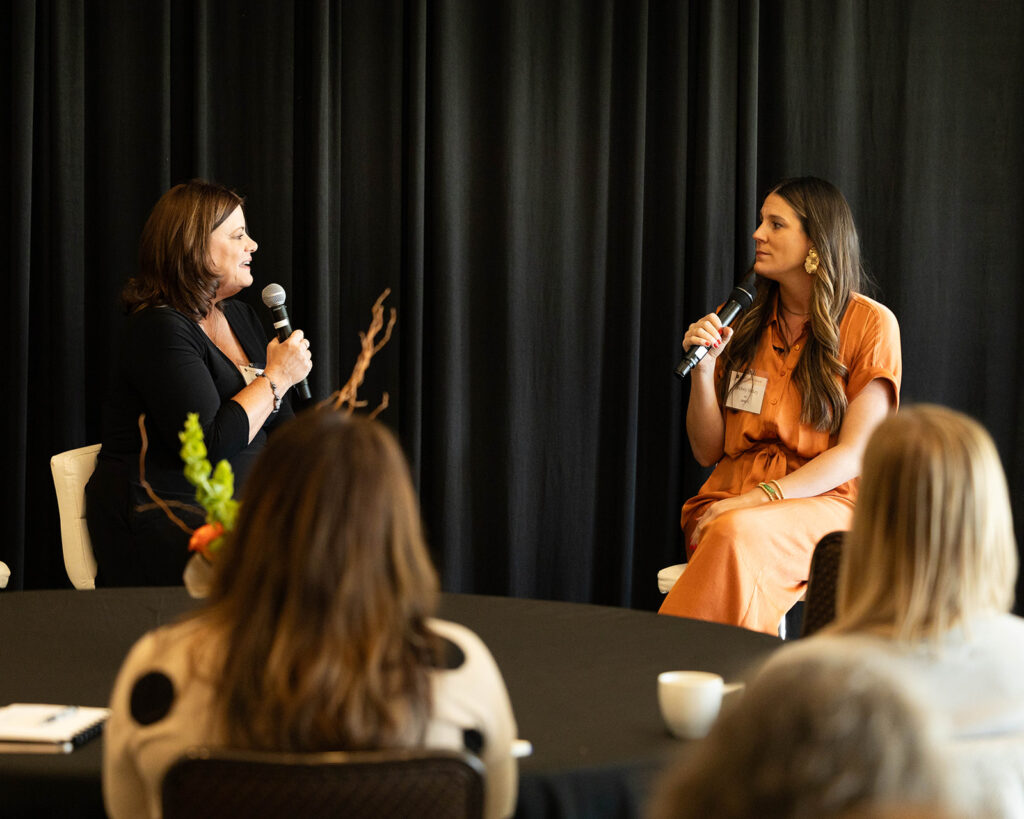Her Starting Point
Q. Let’s start from the beginning. Where did you grow up? How did your upbringing get you interested in the food industry?
A. I grew up in the Chicago suburbs and always enjoyed hearing my mom’s wild stories about working at the Chicago Board of Trade in the 70’s. While I planned to become a physical therapist, landing a job with my uncle (the same way my mother got her job) during college steered my interests toward working in commodities and with farmers pretty quickly.
Q. How did you know commodity trading and the food industry was for you?
A. I realized early on that working with farmers meant that I was working for and with the people that feed that world. Knowing that I was going to be talking to soybean farmers in Georgia or cotton producers in Texas on a daily basis to discuss their life as well as risk management needs became an essential part of my life. It didn’t take long for me to realize my career was more than just a job, it was about building long-lasting relationships and being a part of helping communities thrive.
Q. What first steps did you have to take to establish yourself in your profession?
A. That is a difficult question for me to answer because, looking back, I think I was established earlier in my career than I thought but I was never aware of it. There had always been a lack of confidence from the constant comments that undermined me or that focused on my physical appearance instead of my mind. The best answer I have is that I read everything I could get my hands on; gaining knowledge about the business meant that eventually, I would gain trust and respect being completely self-taught.
Her Big Break
Q. Can you describe the early days of your career? How did your enthusiasm for commodities drive your career growth?
A. I was only 19 and the only woman in an office full of career brokers and ex floor traders that assumed my only capabilities were signing checks, picking up lunch and answering phones. To their credit, I was given massive responsibility within the first year as the team became more open to my presence; though that didn’t mean I was paid more… my life was consistently made up of trying to prove myself to every doubter in the room and they were plentiful. I worked countless hours, five times as hard as any colleague and took any mistreatment that came my way because that’s what I thought I needed to do to someday succeed. After working minimum wage for nearly five years running a company and its 21 offices, I was offered a job in Texas to manage a large book of cotton business. My career has only gone up since the moment I took that risk, which made all the back-breaking hours in Chicago worth it – eventually.
Q. During that time, you were one of the few females in commodity trading, what were some of your key challenges and how did you overcome them?
A. A key challenge was having to try to find a way to rise above people that are doing their best to hold you back. Telling you that you will never make it. Being unwilling to teach or show you anything because they don’t care about your success. One way I overcame it was by finding an amazing woman to look up to that went through all the same things I had when she was my age but now had her own business. She was the perfect example of where I wanted my life to go and through her, I saw that it would be possible. Additionally, I tried to just focus on getting the job done and keeping customers happy – that’s what got me through.
Q. What advice would you give to women today who are a minority in their industry segment or workplace?
A. A lot has changed over the past decade and I have enjoyed watching the transition. But one thing that I don’t believe has changed because I continue to hear women tell me they struggle with it, is that many of us still have to work twice as hard as our male colleagues to gain the same respect and that can become incredibly discouraging. My advice first is to align yourself with a company that won’t hold you back and that sees your value immediately. I have been fortunate to have found that here. Find a female role model that is going to be a constant reminder to you that you are capable of achieving your dreams no matter what you are told. It pains me to have to be writing about this in 2020 and it pains me to still have women come to me with these issues, but we cannot ignore them.
Q. Throughout your career, what significant industry changes were most impactful and memorable?
A. Nothing is ever quick enough for me, automatic doors and sinks are too delayed, people are typically too slow for me on the sidewalks and when something isn’t getting done fast, I end up doing it myself. Not to say that I am struggling with all the same things I was ten years ago but there was still a need for a women’s group in this space and since I am focused in dairy, I just started a Women in Dairy networking group from my apartment. It hasn’t just helped me, it has helped many female traders, brokers, and bankers in the food industry gain more confidence knowing they have an ally when heading into conferences that are primarily made up of men.
Q. You have become an expert in a wide variety of commodities, what was the most challenging part in learning the various markets: grains, cotton, dairy?
A. Grains and cotton were pretty similar in the sense that they are row crops that can ultimately be stored for later use. Working with a perishable product such as milk created more complexity than the other markets. And not just that, the uses for grains and cotton are limited versus every commodity that is made from milk. Once you learn the fundamentals of milk, you then have to figure out the other components and commodities such as butter, cheese (mozzarella, cheddar, swiss, etc), nonfat dry milk, whole milk powder. I’ve been in dairy for nearly six years and I continue to learn something new every other week.
Her Perspective:
Q. Can you share what a typical work week looks like for you today as the Director of Global Operations at HighGround Dairy?
A. Working for a small company means wearing many hats, which I have perfected throughout my career. My work weeks are a combination of global analysis as well as sales and customer service. At the drop of a hat, I have to be able to stop writing about China or New Zealand, stop thinking like an analyst and turn toward managing our invoicing structure, planning our next big conference or building out our website. There is always something new to tackle each week and my position will continue to change as the company continues to grow.
Q. What do you love most about your job and company today? What career achievements are you the proudest of?
A. Without this job, I likely would not have gotten the opportunity to travel around the world. I may not have mentioned this earlier, but I never did get that nursing degree – I chose to work three jobs at one point just to be able to keep my job at the trading company (that didn’t always pay me). I had to remind myself that it would be worth it someday if I just put my head down and got the job done. So that’s what I am most proud of, my persistence and strength to overcome the odds of being a woman in commodities, that is self-taught without a degree and is now helping run an incredibly successful company in Chicago.
Q. What advice would you have for someone who is trying to get a role in the commodity segment of the industry?
A. What skills/knowledge were the most impactful to your success? You have to be hungry for knowledge to make it through this industry. No matter how hard my job got (there was one point that I had duodenal ulcers, stomach ulcers and intestinal ulcers from the stress), I couldn’t get enough of it. I couldn’t get enough of learning the markets.
Q. Like many others, you have a very demanding schedule, what are your strategies for maintaining a healthy work/life balance?
A. I won’t claim to have this perfected this just yet – I ended up having to set up a home office at my boyfriend’s house just to make that work so when you find an answer, please let me know! At least I no longer sleep with my laptop in my arms…
We are honored to recognize Alyssa Badger for February’s Member Spotlight. Her drive, honesty, kindness, and candor have been at the center of her self-made career path. She leads by example and has made it a personal mission to raise other women up in the industry through support, advocacy, and education. In this powerful Q&A Alyssa opens up about her career journey from the Chicago Board of Trade to being a thought leader and industry expert in commodities and risk management.
Her Starting Point
Q. Let’s start from the beginning. Where did you grow up? How did your upbringing get you interested in the food industry?
A. I grew up in the Chicago suburbs and always enjoyed hearing my mom’s wild stories about working at the Chicago Board of Trade in the 70’s. While I planned to become a physical therapist, landing a job with my uncle (the same way my mother got her job) during college steered my interests toward working in commodities and with farmers pretty quickly.
Q. How did you know commodity trading and the food industry was for you?
A. I realized early on that working with farmers meant that I was working for and with the people that feed that world. Knowing that I was going to be talking to soybean farmers in Georgia or cotton producers in Texas on a daily basis to discuss their life as well as risk management needs became an essential part of my life. It didn’t take long for me to realize my career was more than just a job, it was about building long-lasting relationships and being a part of helping communities thrive.
Q. What first steps did you have to take to establish yourself in your profession?
A. That is a difficult question for me to answer because, looking back, I think I was established earlier in my career than I thought but I was never aware of it. There had always been a lack of confidence from the constant comments that undermined me or that focused on my physical appearance instead of my mind. The best answer I have is that I read everything I could get my hands on; gaining knowledge about the business meant that eventually, I would gain trust and respect being completely self-taught.
Her Big Break
Q. Can you describe the early days of your career? How did your enthusiasm for commodities drive your career growth?
A. I was only 19 and the only woman in an office full of career brokers and ex floor traders that assumed my only capabilities were signing checks, picking up lunch and answering phones. To their credit, I was given massive responsibility within the first year as the team became more open to my presence; though that didn’t mean I was paid more… my life was consistently made up of trying to prove myself to every doubter in the room and they were plentiful. I worked countless hours, five times as hard as any colleague and took any mistreatment that came my way because that’s what I thought I needed to do to someday succeed. After working minimum wage for nearly five years running a company and its 21 offices, I was offered a job in Texas to manage a large book of cotton business. My career has only gone up since the moment I took that risk, which made all the back-breaking hours in Chicago worth it – eventually.
Q. During that time, you were one of the few females in commodity trading, what were some of your key challenges and how did you overcome them?
A. A key challenge was having to try to find a way to rise above people that are doing their best to hold you back. Telling you that you will never make it. Being unwilling to teach or show you anything because they don’t care about your success. One way I overcame it was by finding an amazing woman to look up to that went through all the same things I had when she was my age but now had her own business. She was the perfect example of where I wanted my life to go and through her, I saw that it would be possible. Additionally, I tried to just focus on getting the job done and keeping customers happy – that’s what got me through.
Q. What advice would you give to women today who are a minority in their industry segment or workplace?
A. A lot has changed over the past decade and I have enjoyed watching the transition. But one thing that I don’t believe has changed because I continue to hear women tell me they struggle with it, is that many of us still have to work twice as hard as our male colleagues to gain the same respect and that can become incredibly discouraging. My advice first is to align yourself with a company that won’t hold you back and that sees your value immediately. I have been fortunate to have found that here. Find a female role model that is going to be a constant reminder to you that you are capable of achieving your dreams no matter what you are told. It pains me to have to be writing about this in 2020 and it pains me to still have women come to me with these issues, but we cannot ignore them.
Q. Throughout your career, what significant industry changes were most impactful and memorable?
A. Nothing is ever quick enough for me, automatic doors and sinks are too delayed, people are typically too slow for me on the sidewalks and when something isn’t getting done fast, I end up doing it myself. Not to say that I am struggling with all the same things I was ten years ago but there was still a need for a women’s group in this space and since I am focused in dairy, I just started a Women in Dairy networking group from my apartment. It hasn’t just helped me, it has helped many female traders, brokers, and bankers in the food industry gain more confidence knowing they have an ally when heading into conferences that are primarily made up of men.
Q. You have become an expert in a wide variety of commodities, what was the most challenging part in learning the various markets: grains, cotton, dairy?
A. Grains and cotton were pretty similar in the sense that they are row crops that can ultimately be stored for later use. Working with a perishable product such as milk created more complexity than the other markets. And not just that, the uses for grains and cotton are limited versus every commodity that is made from milk. Once you learn the fundamentals of milk, you then have to figure out the other components and commodities such as butter, cheese (mozzarella, cheddar, swiss, etc), nonfat dry milk, whole milk powder. I’ve been in dairy for nearly six years and I continue to learn something new every other week.
Her Perspective:
Q. Can you share what a typical work week looks like for you today as the Director of Global Operations at HighGround Dairy?
A. Working for a small company means wearing many hats, which I have perfected throughout my career. My work weeks are a combination of global analysis as well as sales and customer service. At the drop of a hat, I have to be able to stop writing about China or New Zealand, stop thinking like an analyst and turn toward managing our invoicing structure, planning our next big conference or building out our website. There is always something new to tackle each week and my position will continue to change as the company continues to grow.
Q. What do you love most about your job and company today? What career achievements are you the proudest of?
A. Without this job, I likely would not have gotten the opportunity to travel around the world. I may not have mentioned this earlier, but I never did get that nursing degree – I chose to work three jobs at one point just to be able to keep my job at the trading company (that didn’t always pay me). I had to remind myself that it would be worth it someday if I just put my head down and got the job done. So that’s what I am most proud of, my persistence and strength to overcome the odds of being a woman in commodities, that is self-taught without a degree and is now helping run an incredibly successful company in Chicago.
Q. What advice would you have for someone who is trying to get a role in the commodity segment of the industry?
A. What skills/knowledge were the most impactful to your success? You have to be hungry for knowledge to make it through this industry. No matter how hard my job got (there was one point that I had duodenal ulcers, stomach ulcers and intestinal ulcers from the stress), I couldn’t get enough of it. I couldn’t get enough of learning the markets.
Q. Like many others, you have a very demanding schedule, what are your strategies for maintaining a healthy work/life balance?
A. I won’t claim to have this perfected this just yet – I ended up having to set up a home office at my boyfriend’s house just to make that work so when you find an answer, please let me know! At least I no longer sleep with my laptop in my arms…








